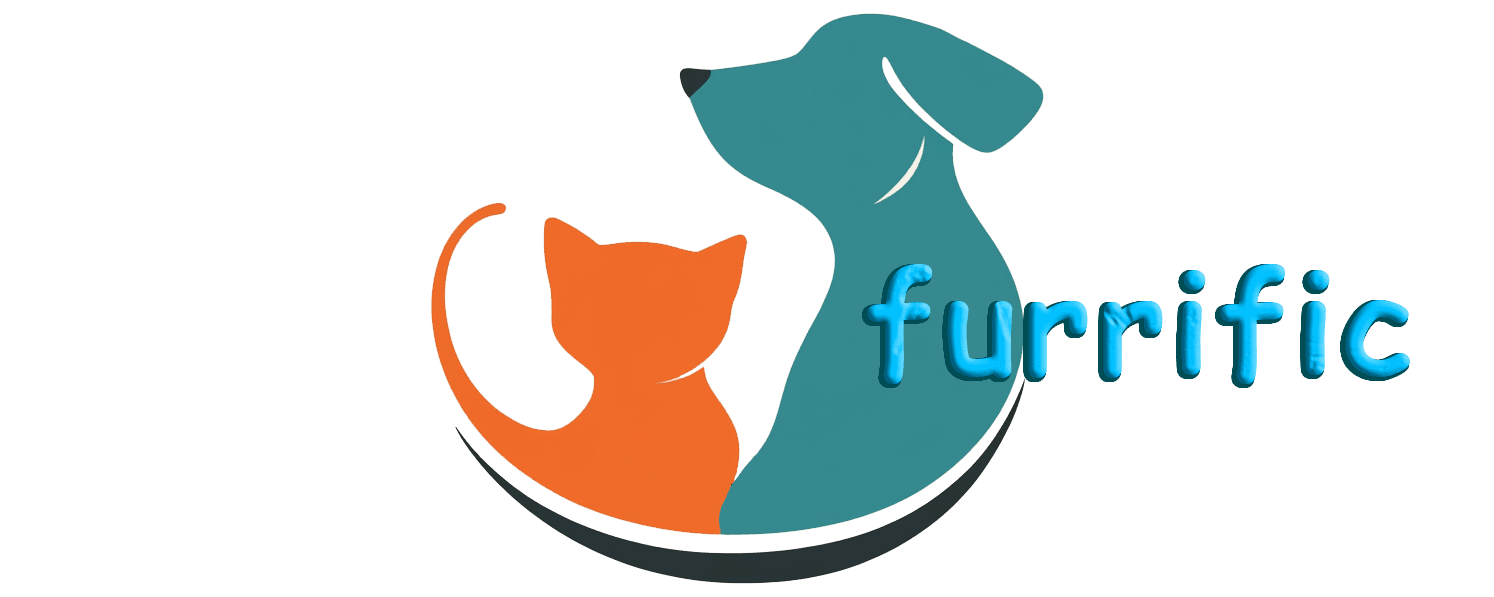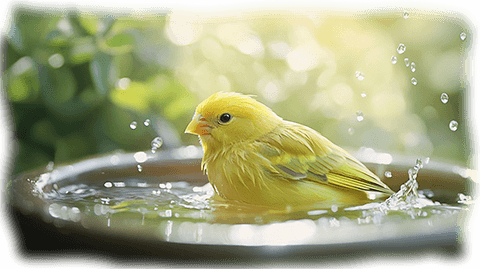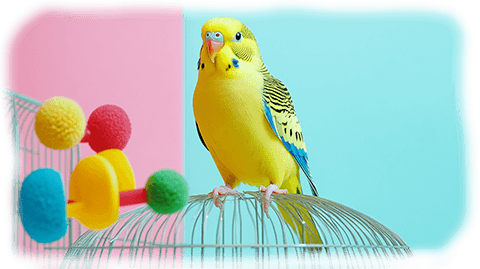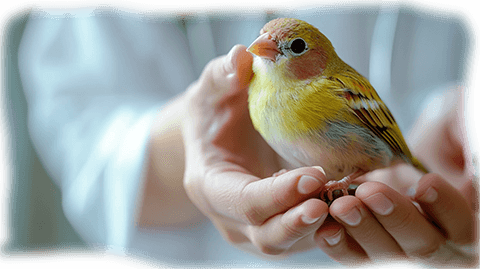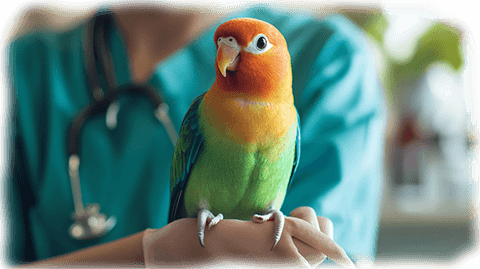Cockatiel Health: Comprehensive Care and Common Health Concerns
Cockatiels are affectionate, playful birds that can make great companions, often bringing joy to their owners with their friendly personalities and whistling abilities. However, like any pet, they require proper care to stay healthy. Understanding the health needs of your cockatiel and recognizing early signs of illness are crucial for ensuring a long and happy life. In this guide, we’ll cover common health concerns in cockatiels, preventive care, and tips for keeping your feathered friend in top condition.
Common Cockatiel Health Issues
Cockatiels are generally hardy birds, but they are still susceptible to a range of health problems. Being able to recognize these issues early can make all the difference in seeking timely treatment and ensuring their well-being.
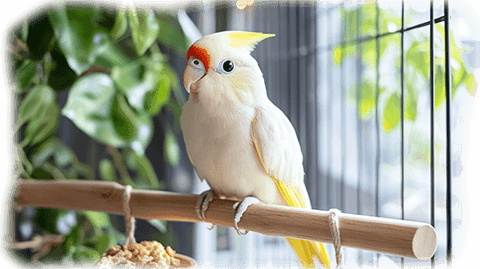
Respiratory Infections
Respiratory infections are one of the most common health issues in cockatiels, particularly if their environment isn’t properly ventilated. Cold drafts, poor air quality, or exposure to airborne irritants can lead to infections. Symptoms to look out for include:
- Sneezing
- Nasal discharge
- Labored breathing or tail bobbing (when the tail moves up and down with each breath)
- Open-mouth breathing or wheezing
Prevention
Ensure your cockatiel’s cage is placed in a well-ventilated area, free from drafts and strong odors like smoke, aerosols, or harsh cleaning chemicals. Regular cage cleaning and providing fresh, clean air will go a long way in preventing respiratory issues.drafts. Keep the cage clean and ensure your bird is not exposed to smoke, aerosols, or strong odors, which can irritate their respiratory system.
Feather Plucking
Feather plucking can be an alarming sign, as it often indicates underlying stress or health problems. Cockatiels may pluck their feathers due to:
- Environmental stress (lack of interaction, boredom, or not enough toys)
- Poor diet (nutrient deficiencies can cause irritation)
- Parasites (mites or lice can cause itching)
- Skin infections (fungal or bacterial)
Prevention
Provide ample mental stimulation through toys, social interaction, and time outside the cage. Ensure they have a balanced diet, and maintain cleanliness in the cage to avoid parasites and infections.e the cage, and interaction. Ensure a balanced diet and regular cage cleaning to avoid parasites and skin issues.

Psittacosis (Parrot Fever)
Psittacosis is a bacterial infection that affects many birds, including cockatiels. It’s important to note that this infection can be transmitted to humans, making prevention essential. Symptoms include:
- Eye discharge
- Lethargy
- Difficulty breathing
- Weight loss
Prevention
Regular vet check-ups and maintaining a clean environment are key to preventing Psittacosis. Quarantine any new birds for at least 30 days before introducing them to your cockatiel to avoid spreading diseases.
Beak and Feather Disease (PBFD)
PBFD is a highly contagious viral infection that affects a cockatiel’s immune system. It’s a serious disease with no cure, and early detection is crucial. Symptoms include:
- Feather loss (beyond normal molting)
- Beak abnormalities (brittle, overgrown, or discolored)
- Weight loss
Prevention
Since there’s no cure, the best approach is prevention through cleanliness and quarantine protocols when introducing new birds. If you suspect PBFD, seek immediate veterinary advice.katiel’s space, and always consult your vet if you suspect PBFD.
Vitamin A Deficiency
Vitamin A is essential for a cockatiel’s immune system, skin, and respiratory health. A deficiency can lead to a variety of health problems, including:
- Sneezing or nasal discharge
- Swollen eyes
- Poor feather condition (dull or brittle)
Prevention
Feed your cockatiel Vitamin A-rich foods such as carrots, sweet potatoes, and dark leafy greens like spinach or kale. A diet composed mainly of commercial pellets (Amazon affiliate link) specifically formulated for cockatiels usually provides adequate Vitamin A.h or kale. Commercial pellets specifically designed for cockatiels usually contain adequate levels of Vitamin A.
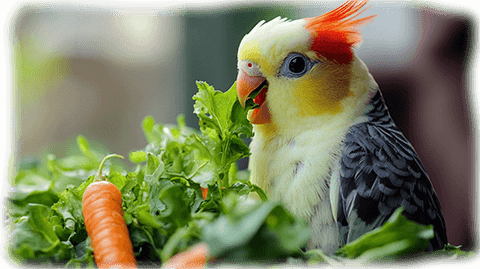
Preventive Health Care for Cockatiels
Preventive care is the best way to keep your cockatiel healthy and happy. By following these tips, you can help avoid many of the common health issues they may face.
Balanced Diet
A proper diet is fundamental for maintaining your cockatiel’s overall health. Cockatiels should not rely solely on seeds, as this can lead to nutritional deficiencies over time. Instead, aim for a well-rounded diet:
- Pellets – These should form the majority of your cockatiel’s diet (Amazon affiliate link) since they contain all the essential nutrients.
- Fresh Vegetables and Fruits – Offer dark leafy greens, carrots, apples, and berries as part of a balanced diet. These provide essential vitamins and minerals.
- Seeds and Grains – Seeds can be given as treats, but they should make up a small portion of their diet.
Cage Cleanliness
Keeping your cockatiel’s living space (Amazon affiliate link) clean is vital for their health. A dirty cage can lead to infections and respiratory problems. Ensure the following:
- Daily cleaning of food and water dishes to prevent bacterial growth.
- Weekly deep cleaning of the cage, removing dirt, droppings, and uneaten food.
- Perch hygiene – Dirty perches can cause foot problems like bumblefoot, so make sure they’re kept clean and dry.
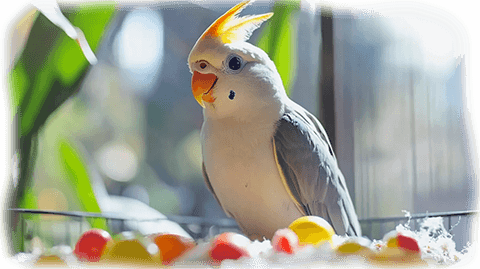
Exercise and Mental Stimulation
Cockatiels are intelligent and active birds, and they need regular physical and mental stimulation to stay healthy. Boredom and inactivity can lead to stress, feather plucking, and weight issues. To keep them engaged:
- Toys – Rotate toys regularly to keep your bird entertained and mentally stimulated.
- Perches of different textures – This keeps their feet healthy and encourages activity. (Amazon affiliate link)
- Time outside the cage – Letting your cockatiel fly and explore in a safe environment outside their cage promotes exercise.
Regular Vet Visits
Even if your cockatiel seems perfectly healthy, regular vet visits are important. Avian vets specialize in bird health and can:
- Perform a comprehensive health check to spot early signs of disease.
- Offer expert advice on diet and care tailored to your bird.
- Vaccinate your cockatiel if necessary, depending on local health regulations and disease risks.
Signs Your Cockatiel Needs a Vet Visit
Recognizing the signs that your cockatiel is unwell can be lifesaving. Birds often hide illness until they are seriously ill, so it’s important to be observant. If you notice any of the following symptoms, seek veterinary care immediately:
- Lethargy or decreased activity (especially if they’re usually active)
- Fluffed-up feathers for extended periods (a sign of illness)
- Difficulty breathing or panting
- Loss of appetite or weight loss
- Changes in droppings (color, consistency, or frequency)
- Unusual vocalizations or complete silence (a normally vocal bird becoming silent can be a red flag)
- Discharge from the eyes, nose, or beak
Cockatiel Health FAQ
How do I know if my cockatiel is sick?
Look for changes in behavior, such as reduced activity, loss of appetite, or altered droppings. Physical symptoms like nasal discharge, sneezing, or labored breathing are also signs something may be wrong.
What should I feed my cockatiel?
A balanced diet with pellets, fresh vegetables, fruits, and limited seeds is ideal. Vitamin A-rich foods like carrots and leafy greens are especially important to prevent deficiencies.
How often should I clean my cockatiel’s cage?
Clean food and water dishes daily and perform a deep clean of the cage at least once a week. Keeping the environment clean is crucial for your cockatiel’s health.
Conclusion
Caring for a cockatiel’s health requires attention to their diet, environment, and mental well-being. Regular preventive care, such as vet visits, a balanced diet, and a clean living space, will ensure that your cockatiel stays happy and healthy for years to come. Always be mindful of changes in behavior or appearance, as early detection of health issues is key to keeping your feathered friend in top condition. With proper care, your cockatiel can live a long, fulfilling life as a beloved companion.
Further reading: “Cockatiel. Cockatiels as Pets. Cockatiel book for care, costs, feeding, health, grooming and training” (Amazon affiliate link) by Louis Vine.
Affiliate Disclosure
This post may contain affiliate links, which means I earn from purchases made through links. Please see the privacy policy page for more details.
